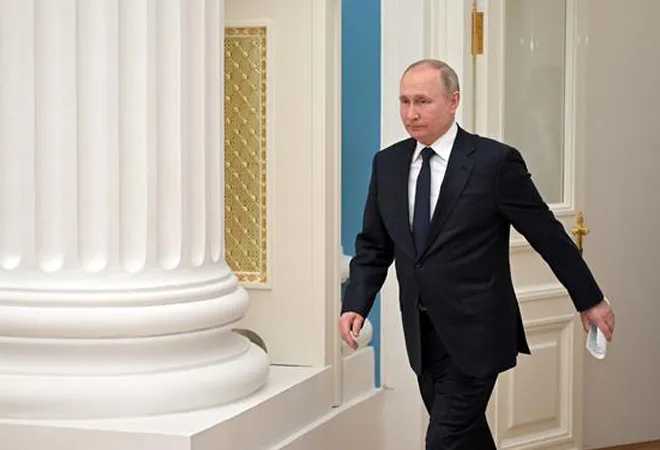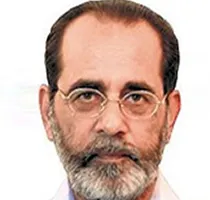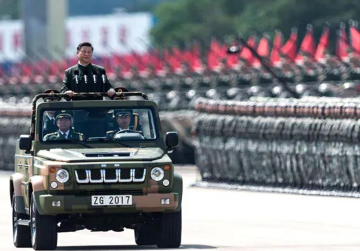This brief is a part of
The Ukraine Crisis: Cause and Course of the Conflict.
Diplomacy has retreated as the smouldering Ukraine crisis took a decisive turn this week. On February 24, Russian President Vladimir Putin launched “special military operations” with the objective of “demilitarising Ukraine” but not “occupying” it. Just days prior to this, Russia had upped the ante by recognising the sovereignty of the Peoples’ Republics of Donetsk and Luhansk, two of Ukraine’s easternmost provinces and deploying Russian peace-keeping forces in these territories. A meeting between United States Secretary of State Antony Blinken and Russian Foreign Minister Sergei Lavrov stands cancelled and the prospects of a summit between U.S. President Joe Biden and Mr. Putin have evaporated into thin air.
The Russian actions have been strongly condemned and sanctions imposed by the U.S., the European Union (EU), the United Kingdom, Australia, Canada and Japan. After 1945, this is the second time that national boundaries are being redrawn by force; the first was the 1999 North Atlantic Treaty Organization (NATO) air strikes on Serbian forces that led to the creation of Kosovo. Russian and Chinese protests about NATO undertaking “out of area operations” without United Nations Security Council approval carried little weight.
A crisis in the making
In the post-Cold War world that promised a rule-based liberal international order, clearly the message from Thucydides’ Peloponnesian Wars still held — “the strong do what they can and the weak suffer what they must”.
In 2022, Russia has fired the first shot but NATO is not blameless either. The Ukrainian crisis has been in the making for over a decade. After the fall of the Berlin Wall in late-1989, then U.S. Secretary of State James Baker was meeting Soviet President Mikhail Gorbachev in Moscow in February 1990 to help ease the way for German unification. He assured Mr. Gorbachev that NATO understood the “need for assurances to the countries in the East”, adding that even with Germany a part of NATO, “there would be no extension of NATO’s jurisdiction one inch to the east”.
After the fall of the Berlin Wall in late-1989, then U.S. Secretary of State James Baker was meeting Soviet President Mikhail Gorbachev in Moscow in February 1990 to help ease the way for German unification.
By end-1991, USSR had broken up into 15 countries; Mr. Gorbachev faded into history and a change in the White House was under way. Rather than look for a new European security framework, the newly independent Baltic and central European states sought security in a U.S.-led NATO. The old caution that the cost of expansion goes up as it reaches closer to the Russian border was discarded and NATO adopted an ‘open door’ policy.
Beginning in 1999, NATO has added 14 new members in stages. At the NATO summit in 2008, at U.S. President George Bush’s urging, an in-principle opening for Ukraine and Georgia was announced, though France and Germany, conscious of Russian concerns, successfully opposed defining a time frame. It was a bad compromise and the damage was done.
Later that year, Russia intervened in Georgia on the grounds of protecting the Russian minorities and took over the northern provinces of Abkhazia and South Ossetia. In 2014, following the Euromaidan protests against the pro-Russian President Viktor Yanukovich, Mr. Putin annexed Crimea. For Russia, Crimea is vital as the peninsula hosts Russia’s Black Sea fleet, providing it access to the Mediterranean and its bases at Latakia and Tartus in Syria. At the same time, pro-Russia separatists, assisted by Russian mercenaries, created autonomous regions in the Donbas region.
Despite no timeline for membership, Ukraine was made a NATO Enhanced Opportunity Partner in 2020. The presence of British and U.S. warships in the Black Sea began to increase. In 2019, the U.K. entered into a cooperation agreement with Ukraine to develop two new naval ports, Ochakiv on the Black Sea and Berdyansk on the Sea of Azov, a move that Russia saw as potentially threatening.
Clearly, Mr. Putin’s grievances, beginning with NATO’s bombing of Serbia in 1999, interventions in Afghanistan, Iraq and Libya and colour revolutions to engineer regime changes, the U.S.’ unilateral withdrawal from the Anti-Ballistic Missile (ABM) Treaty in 2002 coupled with missile defence deployments in Poland and Romania that Russia perceived as offensive, were accumulating.
Faltering European diplomacy
France and Germany initiated talks between Ukraine and Russia under the Normandy format leading to the Minsk agreements, in 2014 and 2015. The first was for a ceasefire between Ukraine and the Russian-backed separatists and the second was between Ukraine, Russia, the two separatist regions of Luhansk and Donetsk and the Organization for Security and Co-operation in Europe (OSCE). Supportive declarations by France and Germany were intended to address Russian security concerns. Ukraine undertook to introduce certain constitutional amendments to provide a degree of autonomy to the two provinces and Russia was to assist in withdrawal of all foreign forces. However, neither side implemented and positions have only hardened since.
Supportive declarations by France and Germany were intended to address Russian security concerns. Ukraine undertook to introduce certain constitutional amendments to provide a degree of autonomy to the two provinces and Russia was to assist in withdrawal of all foreign forces.
In the intense diplomacy during the last six weeks, particularly the back-to-back visits by French President Emmanuel Macron and German Chancellor Olaf Schulz to Moscow and Kiev, there was talk of reviving the Normandy format. But Ukrainian President Volodymyr Zelensky was in no mood to oblige with over 1,50,000 Russian troops poised on his border and Mr. Putin was looking for his own face saver. Mr. Macron has a difficult re-election coming up in April and Chancellor Schulz has already been criticised for being soft on Russia because of energy dependency.
Mr. Biden faces a critical mid-term election in November that could see the Senate shift to Republican control and had already faced considerable flak for the messy withdrawal from Afghanistan last year. His aim was to ensure trans-Atlantic unity in NATO. Russia’s threatening moves made NATO members, especially the Baltic states (Estonia, Latvia and Lithuania) and the central Europeans like Poland and Romania, especially nervous. Finally, NATO remained united but unable to provide an off-ramps solution.
Putin’s chess gambit
With a military force of 2,00,000 and an equal number of reserves, prudence dictates that Mr. Putin would not want to take over Ukraine. However, the separatist groups that currently control only part of the provinces of Luhansk and Donetsk would want to extend their territory beyond the current Line of Contact dividing the separatists and the Ukrainian forces.
Along the Black Sea coast, Russia could seek to extend a coastal corridor to the Crimean Peninsula. This would cement its hold on the Sea of Azov, giving it control over Mariupol and Berdyansk and restrict Ukraine to Odessa in the west.
A Russian military presence in Belarus puts pressure on the 65-mile long Suwalki corridor that constitutes the boundary between Lithuania and Poland and more importantly, separates Belarus from Kaliningrad, the Russian enclave on the Baltic Sea that hosts its Baltic fleet.
Ideally, Mr. Putin would have liked to bring about a regime change in Kiev, but that seems unlikely now. Domestic troubles in Belarus have made President Alexander Lukashenko, in power since 1994, dependent on Russian support. Both countries announced that the 35,000 Russian soldiers, in Belarus for joint exercises that concluded on February 20, would stay on for ‘training cooperation and inspections’. A Russian military presence in Belarus puts pressure on the 65-mile long Suwalki corridor that constitutes the boundary between Lithuania and Poland and more importantly, separates Belarus from Kaliningrad, the Russian enclave on the Baltic Sea that hosts its Baltic fleet.
Mr. Putin may claim victory in the near term, but in the long term, he has over-reached himself. NATO has been rejuvenated, the trans-Atlantic unity strengthened and Russia’s economic ties with Europe have been adversely impacted. Given Russia’s considerable foreign exchange reserves, of nearly $640 billion, sanctions imposed by the U.S. and EU may not hurt immediately but eventually will begin to bite both the oligarchs and the common people. Worse, Russia will become more dependent on China — for political support as well as a market for its energy exports. This will eventually weaken its hand in central Asia.
Russians have been the greatest chess players and President Putin knows that a move on the chessboard will close certain options while opening up others. The challenge is to constrain the adversary’s options while increasing one’s own options and space for manoeuvre. His actions this week may yield tactical gains but hardly pass the test for strategic victory.
This commentary originally appeared in The Hindu.
The views expressed above belong to the author(s). ORF research and analyses now available on Telegram! Click here to access our curated content — blogs, longforms and interviews.




 PREV
PREV


